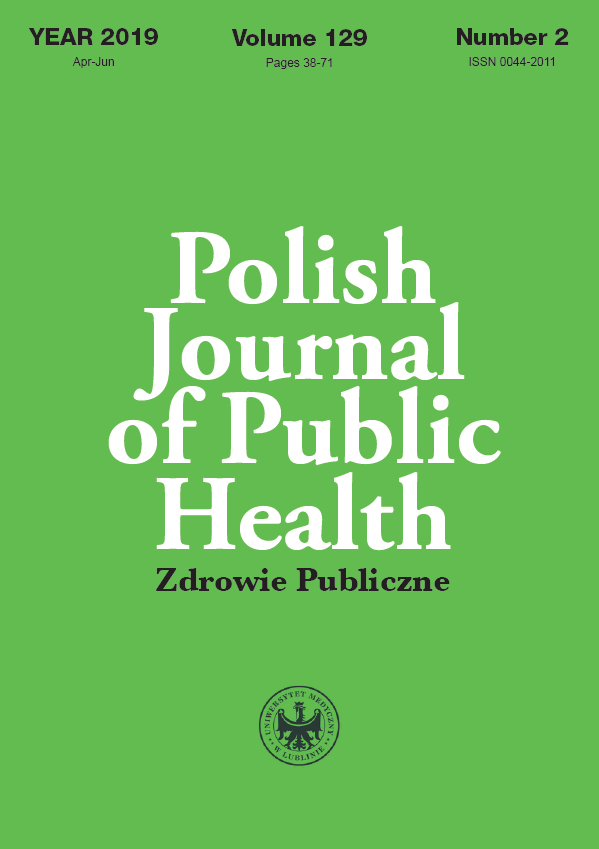Communication and perioperative care of elderly patients
DOI:
https://doi.org/10.2478/pjph-2019-0013Keywords:
communication, perioperative care, old age (elderly patient)Abstract
Communication is one of the basic human needs, it builds trust and facilitates people-to-people contacts. This is widely understood exchange of information as well as feelings, it is both; discussion and argumentation.
The basis for effective treatment is proper communication between the medical staff and the patient. Nurses, medical careers working with elderly people are often in a situation where it is difficult for them to communicate with the patient. Ignorance of the physiology of human aging, difficulties and diagnostic limitations may lead to errors of medical personnel.
The objective of the article is to draw attention to the role of communication among nurses, supported by medical caregivers, who deal with an elderly patient in pre-, peri- and postoperative period, as well as to point out that nursing staff is insufficiently involved in creating standards of medical care.
Lack of training, outlines and guidelines in the field of communication and geriatrics, in the treatment and care of elderly patients result in ignorance, intuitive, incomplete and accidental action, without intentional continuity, what may result in deterioration of care and may contribute to an increase in perioperative mortality of older people.
References
1. www.senior.gov.pl
2. Leng SX. Serum levels of insulin-like growth factor-I (IGF-I) and dehydroepiandrosterone sulfate (DHEA-S), and their relationships with serum interleukin-6, in the geriatric syndrome of frailty. Aging Clin Exp Res 2004;16(2):153-7.
3. Grabowski K, Markocka-Mączka K, Tabołą R. Czy istnieją różnice w postępowaniu z pacjentem chirurgicznym w starszym wieku? Psychogeriatria Pol. 2013;10(3):109-114.
4. Michalik E. Przedoperacyjna ocena i postępowanie okołooperacyjne u chorych w wieku podeszłym. Post Nauk Med. 2008;11:712-21.
5. Drwiła R, Sadowski J. Opieka pooperacyjna u pacjentów w wieku podeszłym. Kardiol na co Dzień. 2010;5:102-7.
6. Pisarska M., Protokół ERAS (enhanced recovery after surgery) – współczesna kompleksowa formuła opieki okołooperacyjnej dla poprawy wyników leczenia. www.mp.pl.
7. www.opiekunmedyczny.com.pl.
8. Bielecki K, Kaniewska A. Wiek jako czynnik ryzyka leczenia chirurgicznego chorych w podeszłym wieku. Post Nauk Med. 2008;11:708-11.
9. Poznańska S, Płaszewska-Żywko L. Wybrane modele pielęgniarstwa. Kraków: Wydawnictwo Uniwersytetu Jagiellońskiego; 2001.
10. Larsen R. Anestezjologia. Wrocław: Urban & Partner; 2003.
11. www.imul.pl/ VII. Relacja i komunikacja z pacjentem specyficznym – osoba starsza.pdf
12. Kępiński A. Poznanie chorego. Warszawa: Wydawnictwo Literackie; 2002.
13. Makary-Studzińska M. Komunikacja z pacjentem. Lublin: Wydawnictwo Czelej; 2012.
14. Demeure MJ, Fain MJ. The elderly surgical patient and postoperative delirium. J Am Coll Surg. 2007;204(1):191.
15. Agostini J, Inouye S. Delirium. In: J. Halter, J. Ouslander, M. Tinetti, et al. (eds). Principles of geriatric medicine and gerontology. 5th ed. New York: McGraw-Hill; 2003.
16. Aguero-Torres H, von Strauss E, Viitanen M, et al. Institutionalization in the elderly: the role of chronic diseases and dementia. Cross-sectional and longitudinal data from a population based study. J Clin Epidemiol 2001;54(8):795-801.
17. Historia i motywy powstania protokołu ERAS, który zmienił opiekę okołooperacyjną. www.mp.pl
Downloads
Published
Issue
Section
License
Copyright (c) 2019 Polish Journal of Public Health

This work is licensed under a Creative Commons Attribution-NonCommercial-NoDerivatives 3.0 Unported License.


